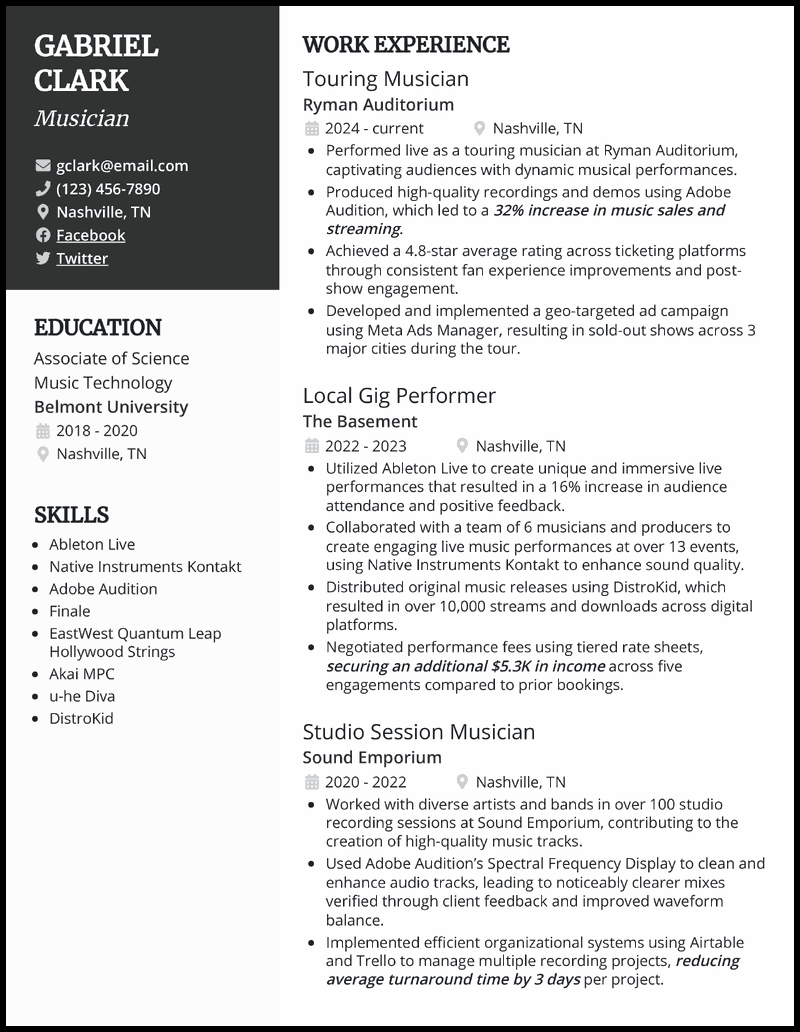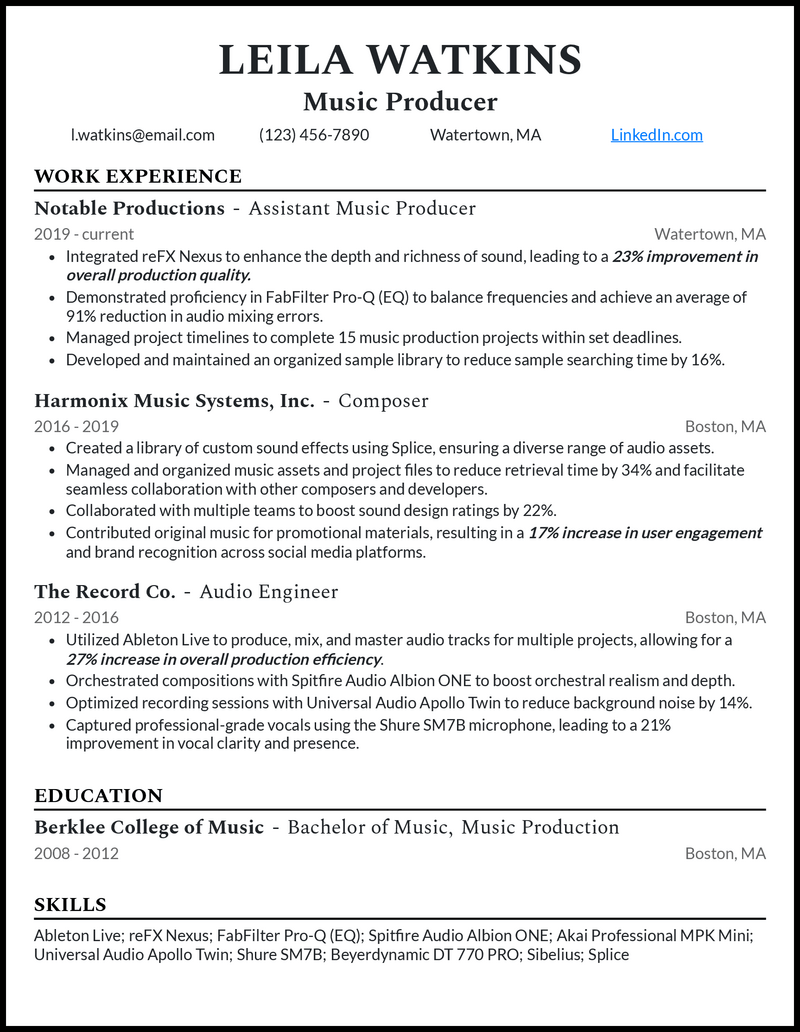You can move a crowd, teach a full schedule, or produce four hits in a weekend, but try putting that on a resume that actually gets noticed? That becomes a hurdle.
Whether you’re applying to a conservatory, auditioning for a band, booking your next tour, or just want to stop ghosting your dream jobs, a great music resume should be more than your stellar performances or mastery of instruments. Beyond your obvious talent, you must showcase your reliability, collaboration, and the value you’ll bring to every stage, session, or classroom.
This guide presents 7 role-specific music resume examples to help you:
- ✅Write a resume that defines career-building results without trying too hard
- ✅Compact it all in one-page resume, even if your experience spans genres, projects, and non-traditional roles
- ✅Point you to a resume-writing strategy that actually work in today’s music industry, and avoid tactics that would fall flat for creatives
Why this resume works
- For your music resume, include performances, projects, and skills that showcase your musical talent.
- If you’re proficient in multiple instruments or music styles, by all means, indicate this to display your versatility.
- And mention significant performances or tours you’ve been a part of to show your experience with performing live.
- Spelling out your promotional capabilities can be helpful to include as well.
Why this resume works
- Music is action, and unless you’re just starting off your career, then you should have several awards under your belt. It could be a fan’s favorite or performance award.
- Whatever you’ve won through hard work and top performances, let it shine in your musician resume. This is you showing the world the fruits of your work and the capabilities you have in store.
Why this resume works
- Teaching experience, musical knowledge, and interpersonal skills should be highlighted front and center on your music teacher resume. Describe your experience working with different age groups or skill levels to show your versatility as a teacher.
- And detail any successful methods or innovative teaching techniques you’ve developed.
- Consider mentioning performances or recitals you’ve organized, illustrating your skills in event planning and student mentorship to make it clear you’re the full package.
Why this resume works
- Your music producer resume should emphasize technical skills and creativity. To do this, highlight projects you’ve produced that gained notable attention or acclaim, and validate them with metrics from social media, sales, or streaming numbers.
- List the software you use and your studio equipment knowledge to demonstrate technical competency.
- Discuss successful collaborations with musicians or audio engineers to show you’re a team player and a pleasure to work with.
Why this resume works
- Have songs that made it to the Grammy nomination list? It doesn’t matter that you didn’t win in the nominated category; you should mention it in your music industry resume.
- Why? Because Grammy is the industry’s yard stick of how your music and lyrics have been influential globally and deserve recognition. Besides, potential contractors would be impressed by such a feat.
Why this resume works
- Yes, for vocalists, a little rough around the edges can make for a more authentic sound, but when it comes to writing your music performance resume, please ignore that advice; your pitch must be as flawless as porcelain!
- Give your music performance resume the kind of once-over that leaves no room for grammatical gaffes like typos, incorrect capitalization, wrong tenses, awkward phrases, and run-on sentences. And please keep the tense active; passive lingo is that background noise nobody asked for.
Why this resume works
- Career-transforming music directors call the shots and make things happen. So, our point is, if you put showcasing outstanding leadership skills in your resume on the back burner, it’s like you’re straight-up throwing away any shot at scoring an interview.
- How about making your music director resume more compelling by enriching it with phrases pointing to your capability to hold the reins? Take, for example, “overhauled the organization of over 512 music pieces using Splice, improving music library accessibility and saving three hours of search time per season.” Now, that’s how you shout from the rooftops about your leadership chops.
Tailor Your Music Resume to Match the Job Perfectly

Expressing your skills in music in a resume might seem like the hardest thing in the world. After all, how do you convey your unique talent for creating, singing, composing, mixing, or performing beautiful songs?
Fortunately, there’s a way to do this, and it’s really quite simple. Start by reading the job description carefully and then pick out a few of the key skills that you possess. Next, fill out the rest of this section with job-specific abilities.
For instance, if you’re a music teacher, include the instruments you’re proficient in or the ability to create a curriculum. On the other hand, a singer would want to include ear training or lyric writing.
Need some ideas?
15 most popular music skills
- Music Theory
- Sound Design
- Audio Engineering
- Pro Tools
- Songwriting
- Instrument Proficiency
- Arranging Music
- Vocal Technique
- Ableton Live
- Music Notation
- GarageBand
- Finale
- Ear Training
- Logic Pro
- Sibelius

Your music work experience bullet points
As you work in music, “work experience” can mean anything from recording singing TikToks to touring with a band or helping singers as a vocal coach.
Depending on your exact role, your bullet points may vary greatly, but these points should always be centered around your top achievements. Add some extra spice by including metrics and figures that describe your impact as a musician.
Don’t forget to really own your accomplishments by using active verbs that show you were in charge of things.
- If you’re a performer, you can include metrics like social media follower counts or the size of the audiences you’ve performed for.
- Paving your own way in the music world means being heard, so if you’ve ever released any songs, mention the platforms you used and the number of listeners you’ve accumulated.
- Music producers have a lot of interesting metrics to include, such as improvement in production quality, reduction in audio mixing errors, or even cutting down on sample searching time through meticulous organization.
- If you teach music, be it an instrument, singing, or music theory, zone in on the successes of your students. Describe the number of people you taught, the improvements they have seen, and the accolades you (or they) have received.
See what we mean?
- Integrated reFX Nexus to enhance the depth and richness of sound, leading to a 23% improvement in overall production quality
- Produced high-quality recordings and demos using Adobe Audition, resulting in a 32% increase in music sales and streaming
- Developed and implemented creative marketing strategies that resulted in a 44% increase in concert attendance
- Coached students for regional music competitions and auditions, which led to a 74% school-wide success rate
9 active verbs to start your music work experience bullet points
- Created
- Performed
- Produced
- Integrated
- Developed
- Orchestrated
- Composed
- Managed
- Collaborated
3 tips for writing a music resume for newer musicians
- Show, don’t tell
- You can elevate your application by adding examples of your work, such as songs you’ve composed or sound bites you’ve created. Put these up on YouTube, Google Drive, or your personal website, and attach a link at the top of your resume.
- Don’t forget to mention software
- It’s no secret that making music today goes hand-in-hand with being tech-savvy. If you’re proficient in industry-specific tools, such as FL Studio, MuseScore, or SmartMusic, mention it in your resume.
- Never send out the same resume twice
- Express your dedication and drive for this particular gig by always tweaking your resume to match the job description. Adjust your skills and experience, but also write a cover letter that goes into detail on your experience in music.
3tTips for writing a music resume if you already have some experience
- Talk about your successes
- Depending on your exact career, this can mean a lot of things, but in short—don’t be shy to brag. Include your social media links if you’ve amassed a following, talk about the number of songs you worked on, or add a clip that demonstrates your impressive vocal range.
- Highlight your awards
- Piggybacking off the previous point—if you’ve ever won any awards, put them in a neat little section on your resume. This doesn’t have to mean a Grammy. Even winning a local contest or mixing a song that made it onto an official Spotify playlist is worth a mention.
- Describe your diverse experience
- Showing your love of music can be done in many ways. Instead of only expressing your professional successes, you can also mention volunteer work, such as teaching guitar classes to local children. This shows that music is your passion and not just a job.
Music Resume FAQs

Valuable music skills to include on your resume are proficiency in at least one instrument or voice, strong knowledge of music theory, sight-reading, composition, improvisation, and conducting. Additionally, you can include collaboration in ensembles, audio production using DAWs such as Logic Pro or Ableton, ear training, and experience with music teaching or coaching.
The main sections for a music resume include summary or objective (optional), performance experience, teaching experience, technical and musical skills, education, and awards or honors. Each section should be clearly marked with a header, concise, consistently formatted, and tailored to the role.
A private music resume should focus on the proficiency of instruments, the age range and skill level of students, and the nature of sessions (private, group, online, or in-person). Key sections include relevant teaching experience, educational background, certifications, a brief teaching philosophy, and notable student achievements.












